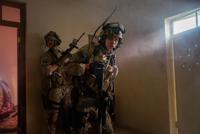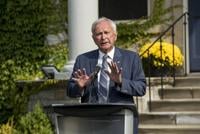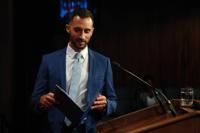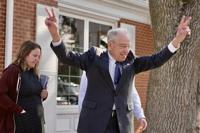TORONTO - DÔÇÖPharaoh Woon-A-Tai says heÔÇÖs drawn to stories that challenge what people think they know. In the new A24 drama ÔÇťWarfare,ÔÇŁ that meant showing the harsh reality of who actually fights wars.
ÔÇťGrowing up, I watched a lot of war films. And not to throw any war films under the bus, but a lot of the time these men are depicted to be a lot older than people on the front lines truly are,ÔÇŁ says the 23-year-old Toronto actor.
ÔÇťItÔÇÖs often The Rock-type actors on the screen, and you donÔÇÖt really realize that itÔÇÖs very young people who are on the front lines. I didnÔÇÖt realize that until doing this film, to be honestÔÇŽ WeÔÇÖre sending children to wars.ÔÇŁ
ÔÇťWarfare,ÔÇŁ co-written and directed by Alex Garland and former U.S. Navy SEAL Ray Mendoza, is a harrowing recreation of a chaotic 2006 Iraq War mission, drawn from MendozaÔÇÖs own experience on the ground in Ramadi. He says the average age of his unit was 20.
Woon-A-Tai portrays the character that's based on Mendoza, joining an ensemble of Hollywood ÔÇťitÔÇŁ boys ÔÇö including Kit Connor, Joseph Quinn, Will Poulter and Michael Gandolfini ÔÇö as American soldiers.
In Toronto this week to promote the film, out Friday, Woon-A-Tai, Garland and Mendoza emphasized that ÔÇťWarfareÔÇŁ is not a typical war drama ÔÇö itÔÇÖs a cinematic gut punch, meant to dismantle myths and glorified images of combat.
Woon-A-Tai broke out with his Emmy-nominated turn as Bear Smallhill in FX dramedy ÔÇťReservation Dogs,ÔÇŁ which follows four Indigenous teens in Oklahoma trying to outrun grief and poverty. He sees similarities in the way that show and ÔÇťWarfareÔÇŁ humanize groups Hollywood often oversimplifies.
ÔÇťÔÇśReservation DogsÔÇÖ represented my community, Native Americans, and we broke down stereotypes within that show,ÔÇŁ says Woon-A-Tai, who is of Oji-Cree, Anishinaabe and Guyanese descent.
ÔÇťThere's a lot of stereotypes in war films about soldiers and this is a film that breaks those down."
After leaving active duty, Mendoza forged a second career in film as a military consultant, advising on scenes such as the climactic White House battle in GarlandÔÇÖs 2024 film ÔÇťCivil War.ÔÇŁ
He says heÔÇÖs read countless scripts where veterans are depicted as addicts who ÔÇťat any moment, we can just snap.ÔÇŁ Portrayals of combat equally frustrate him.
ÔÇťA lot of times, there's a score going over these glorious moments of this guy doing these heroic things. That's just not how it feels,ÔÇŁ Mendoza says.
ÔÇťEspecially when youÔÇÖre running out to save your best friend.ÔÇŁ
ÔÇťWarfareÔÇŁ is dedicated to Elliott Miller, one of the SEALs severely injured in the Ramadi mission. As Miller has no memory of that day, Mendoza wanted to reconstruct it for him in precise, forensic detail. The film has no score, using only the raw sounds of battle ÔÇö gunfire, explosions and soldiersÔÇÖ screams ÔÇö to create tension.
Garland believes audiences generally know most war films are sensationalized and they're ÔÇťcomplicitÔÇŁ in the fantasy.
ÔÇťIt is very typical of our world (that) we would know, watching a war movie, that it is misrepresenting war, but not really careÔÇŽ because itÔÇÖs entertaining,ÔÇŁ says the English director and author.
He wanted to make a film where veterans ÔÇťdidnÔÇÖt have to tense up watching it, thinking how inaccurately they were being represented.ÔÇŁ
Before shooting began, the cast underwent a gruelling three-week boot camp modelled on special forces training. Mendoza says Woon-A-Tai seemed a good fit to play him because of his ÔÇťwillingnessÔÇŁ to embrace the filmÔÇÖs physical demands.
Woon-A-Tai says the camp ÔÇô which included ritualistic head-shaving ÔÇô broke the actors down but brought them closer together.
ÔÇťWe learned to rely on each other,ÔÇŁ he says.
ÔÇťA lot of the egos that some people in my industry may have went right out the door as soon as we shaved each other's hair.ÔÇŁ
The immersive preparation was meant to bring visceral realism to the screen. It's something Garland hopes will leave viewers feeling the full weight of war.
ÔÇťCivilians don't go to war, the military go to war. But civilians make the decisions to go to war. They make the policies and they also elect the politicians that make the policy. War is about as serious as things get on this planet and so it's incumbent on civilians to understand what those wars are,ÔÇŁ he says.
ÔÇťIf we're going to traumatize, kill and maim young people from one country and the citizens of another country, we ought to know what we're doing when we do that.ÔÇŁ
This report by ║├╔źtvwas first published April 11, 2025.








































